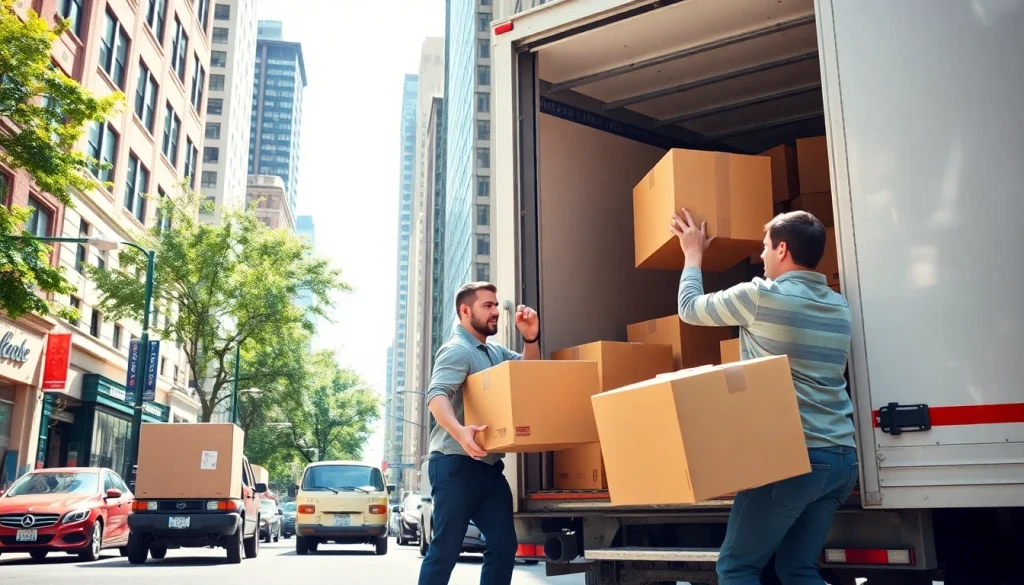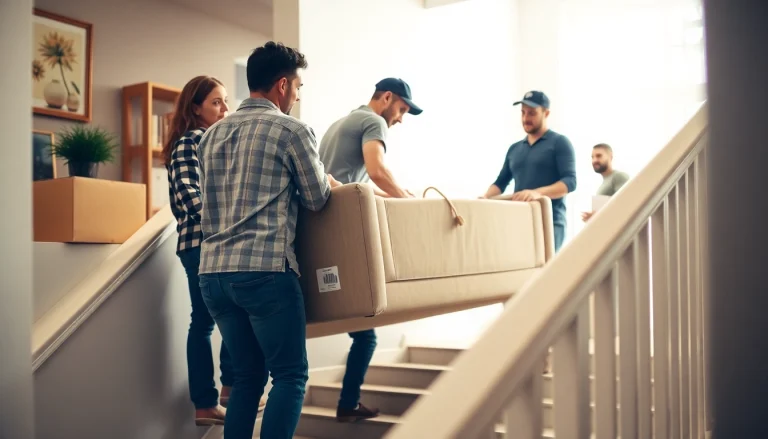
Understanding House Moves
House moves can be a monumental task that brings a mix of excitement and stress. Whether you are relocating across the street or to a different city, the logistics involved require careful consideration and planning. A successful move depends not only on the physical act of transportation but also on the streamlined processes that support it, from packing to organization. In this guide, we will delve into every aspect of house moves to ensure that your next relocation is as seamless as possible.
What Constitutes a House Move?
A house move refers to the process of relocating one’s residence from one location to another. This process encompasses a variety of logistics, such as packing belongings, coordinating transportation, and unloading items in the new location. House moves can vary significantly in scope, involving anything from a single room to an entire household worth of possessions. Additionally, moves can be influenced by numerous factors, including distance, size of the household, and the amount of help available.
The Importance of Planning Your Move
Planning is crucial to the success of any house move. A well-thought-out moving plan can minimize chaos and streamline the entire process. Planning involves scheduling, budgeting, and notifying relevant parties about your upcoming move. Effective planning also includes assessing which items you will take with you, what needs to be sold or donated, and establishing a timeline to accomplish each phase of the move.
Common Types of House Moves
Several types of house moves exist, and understanding these can help tailor your strategy accordingly. Here are the most common types:
- Local Moves: Typically defined as moves within a specific area and usually not exceeding a certain mileage (often 50 miles). Local moves can be completed in one day.
- Long-Distance Moves: These involve relocating to a destination beyond local perimeters, often requiring more complex logistics. The distance can range from a few hundred to several thousand miles.
- International Moves: This is the most complex type of move and involves transferring belongings across country borders. It often requires understanding customs regulations and international shipping logistics.
- Corporate Relocations: Often initiated by employers, these moves involve transferring employees or their families due to job changes.
- Senior Moves: Specialized moving services designed to assist senior citizens moving into retirement communities or assisted living facilities.
Preparing for Your House Move
Creating a Moving Checklist
A moving checklist is an invaluable tool to keep you organized throughout the relocation process. Start by identifying important tasks that need to be accomplished in the weeks leading up to the move. Here is a suggested checklist:
- Set a moving date and budget.
- Declutter and assess items to keep, donate, or sell.
- Create an inventory of items to be moved.
- Notify your landlord (if applicable) or arrange utility disconnection.
- Research and hire a moving company, or arrange for a rental truck.
- Pack non-essentials ahead of time. Label boxes clearly.
- Confirm details with the moving company (if applicable) a few days before the move.
- Prepare an essentials box for immediate needs upon arrival at your new home.
Packing Tips for a Successful Move
Packing is often one of the most daunting aspects of a house move. Here are some effective tips to make the process more manageable:
- Start Early: Begin packing non-essential items at least two weeks before the move.
- Use Quality Packing Materials: Invest in sturdy boxes, bubble wrap, packing tape, and markers for labeling.
- Room-by-Room Approach: Pack items by room to simplify unpacking at the new location.
- Label Everything: Clearly label each box with its contents and destination room to expedite the unpacking process.
- Protect Fragile Items: Wrap delicate items in bubble wrap or towels to prevent breakage.
Hiring Professional Movers vs. DIY
One of the major decisions you will face while preparing for a move is whether to hire professional movers or undertake the job yourself. Consider the pros and cons of each:
Hiring Professional Movers
- Pros: Expertise, efficiency, and access to specialized equipment for handling heavy furniture and fragile items.
- Cons: Higher cost, dependency on others for timeline and execution.
DIY Moving
- Pros: Cost-effective, full control over the process and timing.
- Cons: More physically demanding, increased risk of injury or damage to items without professional help.
When deciding between these options, consider your budget, the complexity of the move, and your comfort level with physical labor.
Executing a Smooth Move
What to Expect on Moving Day
Moving day can be hectic, but certain expectations can help alleviate anxiety. Here’s a general outline of how the day may unfold:
- The moving team arrives early to start loading the truck or moving van.
- Walk through your home with the crew to point out any specific items requiring special care.
- Complete a final walk-through to ensure nothing is left behind.
- Once at your new home, direct the crew on where to place items in each room based on your labeling.
- Conduct an inventory check to ensure everything has arrived safely and in one piece.
Organizing Your New Space Efficiently
Once you’ve arrived at your new home, efficient organization becomes key. Here are strategies to optimize your new space:
- Unpack Strategically: Start with essential rooms like the kitchen and bedrooms to establish functionality.
- Group Similar Items: Categorize and group unpacked items by their respective function and keep them together.
- Utilize Vertical Space: Use shelving and wall-mounted storage to maximize the area and minimize clutter.
Handling Potential Challenges During a House Move
Moving can come with its share of unforeseen challenges. Here are common issues and how to address them:
- Weather Conditions: Prepare in advance for bad weather by having tarps, umbrellas, and gloves handy.
- Last-Minute Changes: Be adaptable; confirm all moving arrangements a day before.
- Establishing Utilities: Ensure that utilities at your new home are set up before you arrive.
Post-Move Considerations
Settling into Your New Home
After the chaos of moving day, settling into your new home can be a delightful experience. Take time to explore your surroundings and familiarize yourself with your new neighborhood. Introduce yourself to neighbors, discover local grocery stores, and check out parks and amenities. Creating connections will enhance your transition.
Updating Your Address and Utilities
Don’t forget to update your address with necessary parties. This can include:
- Home and auto insurance companies.
- Employer and bank.
- Postal service for mail forwarding.
Also, ensure all utilities (electric, water, gas, internet, etc.) are activated in your name promptly to avoid any interruption of service.
Assessing Your Moving Experience
Taking time to reflect on your moving experience will not only help you adjust better but also prepare you for future moves. Consider what worked well and what could have been improved. Think about elements such as timing, communication with movers, packing techniques, and any challenges faced. Documenting these insights can lead to a smoother process in your future relocations.
Optimizing Future House Moves
Learning from Past Experiences
Your first move often provides the richest insights for future projects. Consider creating a moving journal where you document the overall process, obstacles encountered, and solutions discovered. Reviewing this journal before your next move can be highly beneficial.
Tips for Future Relocations
When preparing for future relocations, use these tips to streamline the process:
- Maintain a Moving Binder: Keep all important documents, estimates, and checklists in one dedicated location.
- Stay Organized: Consider a physical or digital inventory management system to track your belongings.
- Utilize Technology: Apps and online tools can simplify organization, budgeting, and tracking moving progress.
Staying Organized for Quick Moves
Sometimes life doesn’t give you a lot of time to plan a move. For these quick relocations, here are strategies to ensure a successful transition:
- Minimize Possessions: The less you have to move, the quicker the process will be. Regularly declutter to reduce items.
- Pre-pack Essentials: Have a moving kit with tools, central documents, and essential daily items that can easily be grabbed.
- Professional Help: In cases of urgency, consider hiring movers who can take the labor off your hands, allowing you to focus on the transition itself.






